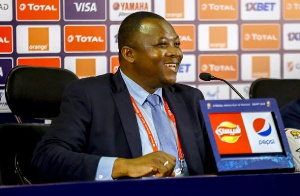- Home - News
- Polls
- Year In Review
- News Archive
- Crime & Punishment
- Politics
- Regional
- Editorial
- Health
- Ghanaians Abroad
- Tabloid
- Africa
- Religion
- Election 2020
- Coronavirus
- Photo Archives
- News Headlines
- Press Release
General News of Tuesday, 8 October 2019
Source: pulse.com.gh
#SexForGrades: BBC’s standards have dropped – Sannie Daara
Former Communications Director of the Ghana Football Association (GFA), Ibrahim Sannie Daara, has hit out at the BBC over its ‘Sex for grades’ documentary.
He said the standards at the BBC have fallen in recent years, adding that the entire documentary was a “clickbait”.
“As a person who formerly worked for the BBC, I am deeply worried about the recent drop in standards at the world's best journalism hub particularly the Africa section,” Sannie wrote, as quoted by Myjoyonline.
“Certainly the BBC Editorial Policy and Standards of Journalism preached by the BBC College of Journalism has not been demonstrated in the piece I have seen this evening.”
The BBC’s undercover documentary, which was premiered on Monday, focuses on sexual harassment in two of West Africa’s most prestigious universities.
Some lecturers from the University of Ghana (UG) and the University of Legos were captured allegedly seeking sexual favours from prospective students in exchange for good grades.
Prof. Gyampo and Dr. Paul Kwame Butakor of UG were both implicated in the documentary, although the former has vehemently denied all the allegations.
Read Sannie Daara’s full post below:
As a person who formerly worked for the BBC, I am deeply worried about the recent drop in standards at the world's best journalism hub particularly the Africa section.
Certainly the BBC Editorial Policy and Standards of Journalism preached by the BBC College of Journalism has not been demonstrated in the piece I have seen this evening.
If I am to compare to what I have seen on BBC 5 Live and Panorama and this BBC Africa Eye team shows some desire from the current editors of the programme to chase numbers at a time the BBC's influence is waning in Africa thus - editors - wanting to stay relevant, embark on totally exaggerated adventures to keep their positions because of the falling numbers.
1. To say sex-for-grades, by no stretch of the English language, means lecturers sleeping with students to give them marks they don't deserve. In this Prof Gyampo issue, this has not been proven so it's a clickbait. We can deal with the other aspects but in this sex-for-grades thingy, the BBC has gone against its own editorial policy of not exaggerating.
2. Has anyone noticed that Nigeria and Ghana are the main targets of the BBC Africa Eye team? Why not Burkina Faso, Benin, Algeria, Egypt and the others? Nigeria and Ghana are among the top five countries that provide the audiences for the BBC World Service. So all the scandalous or damaging stories on Africa will be focused on these countries. Does that mean no crimes or scandals happen on other African countries too?
These thoughts don't excuse any harassment that might have been faced by the ladies.
Entertainment










